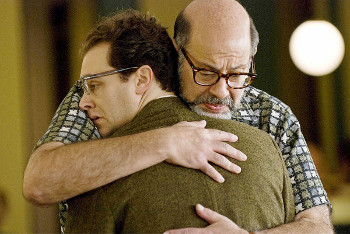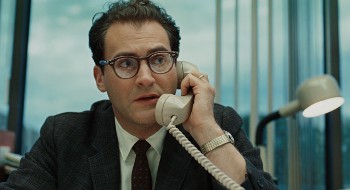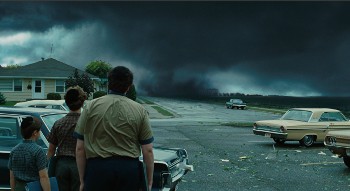A Serious Man
 I was surprised after watching (and then reading reviews of) the Coen brothers’ A Serious Man that there was such a fervent (if small) backlash against it. The movie – about a Job-like Jewish professor in a Minnesota suburb in the late 1960s – struck me as so right that I didn’t allow for opposite reactions.
I was surprised after watching (and then reading reviews of) the Coen brothers’ A Serious Man that there was such a fervent (if small) backlash against it. The movie – about a Job-like Jewish professor in a Minnesota suburb in the late 1960s – struck me as so right that I didn’t allow for opposite reactions.
Yet there they are. Some critics have placed the movie comfortably, derisively in the Coen canon, which is to say that they find it empty and mean – gorgeously made cinema that has no interest in or respect for humanity.
On one level, those naysayers seem to ignore Coen works that are much nastier. Those who see the movie as misanthropic (or as Jewish self-loathing) need to revisit Fargo, which is far more condescending. A Serious Man’s Larry Gopnik, as played by Michael Stuhlbarg, is a deeply inert man, but his accumulated troubles make him a great vessel for audience sympathy, and the focus on him naturally makes him an object of empathy, as well. I like sensible, strong Marge Gunderson but also laugh at her accent, her simplicity, and her gullibility; I feel for Gopnik and the compounded trials he endures, even though he’s mostly paralyzed by them.
And those who see the film as nihilistic misread its existential absurdity, which concentrates a life’s worth of misfortune into a handful of days. The Coens don’t do this out of schadenfreude but for comic effect in pursuit of cosmic questions. A Serious Man asks about the meaning of life and what God is trying to say to us, and even though it refuses to provide any remotely satisfactory answers, it does not reject the value of the endeavor. Fargo explicitly and pointedly notes all the blood that was shed for virtually no gain, and No Country for Old Men’s protagonist loses his wife and his life without reaping any benefit. In A Serious Man, horrible things are foreshadowed for Larry and his entire community, yet the movie is built on the sincere religious belief of its characters – the hope that there is some purpose for their suffering.
Still, a major component of A Serious Man is its slipperiness, its openness. The movie generously allows for (and perhaps embraces) accusations of misanthropy. Whether you love it or hate it, find it cruelly godless or searchingly spiritual, see affection or scorn for the characters, the film will not peep a word of protest. By design, it is what you think it is. And what you think it is depends in large part on how you look at it. Is it a synagogue parking lot, or evidence of Hashem?
But even though art can be interpreted many ways, the text has a voice, too. And the essence of A Serious Man is faith in Hashem, which is illuminated rather than confused by the film’s cryptic core.
A Matter of Perspective?
The Coens offer their critics plenty of ammunition. The movie is gleefully filled with caricatures, from Larry’s shrewish, divorce-seeking wife Judith to her unctiously sensitive paramour Sy Ableman to the ne’er-do-well brother Arthur to the bored-stoner-wife neighbor to the glowering hulk next door to the bratty kids to the Koreans … . The three rabbis are a distillation of this approach to characterization: One cluelessly grasps for a metaphor, one dispenses inscrutable stories as wisdom, and one with great effort lists the names of Jefferson Airplane. Even Larry, in a way, is a caricature – a man who can be accurately reduced to his extreme inaction, with his perplexed refrain of “I didn’t do anything.”
Yet it’s equally valid to see Larry, through accumulated detail, as a human being, and one can infer the conflict within him even as he does nothing meaningful.
 Furthermore, we get three glimpses into his inner life through his dreams: Sy taunting (and beating) him from beyond the grave, a spoiled escape for his brother, and – most tellingly – sex with his neighbor. Besides freedom from conflict, Larry only clearly covets one thing in the movie, when he spies from his rooftop his neighbor’s breasts while she’s sunbathing. But when he dreams of her, she’s wearing a bra: Even the man’s fantasies are unfulfilling.
Furthermore, we get three glimpses into his inner life through his dreams: Sy taunting (and beating) him from beyond the grave, a spoiled escape for his brother, and – most tellingly – sex with his neighbor. Besides freedom from conflict, Larry only clearly covets one thing in the movie, when he spies from his rooftop his neighbor’s breasts while she’s sunbathing. But when he dreams of her, she’s wearing a bra: Even the man’s fantasies are unfulfilling.
A charitable way to view the heavy use of caricature is as a structural choice. The film’s title hints that we should pay attention to man in the singular sense, and that’s reinforced through deft sketching of everything around the central character. One watches the movie not exactly from Larry’s point of view, but through him. I don’t think it’s a stretch that Larry sees these people (probably unfairly) the same cartoon-y way the Coens show them. Again, this stresses the theme of perspective in A Serious Man.
The idea (articulated by the first rabbi) is that Larry could find some answers to the whys of his life if he only looked at things differently. Arthur provides one key when he complains bitterly that God has provided his sibling with all the blessings, while he’s gotten nothing. Arthur here is likely oblivious to some of Larry’s problems, but he’s certainly aware, for example, that his marriage has failed. Larry should take from this that even in his downward slide some people are envious of his good fortune. Larry is reminded of the relative blessedness of his life by his son’s Bar Mitzvah, and by the promised decision of his college’s tenure committee.
But if it’s any good, the movie can’t be reduced to something this simple, that its meaning (or the meaning of anything) depends on how you look at it. That’s a convenient, vague, and cheap cop-out. A Serious Man is still, in a broad sense, a mirror for the viewer, but it’s far more complicated and rich than that half-full/half-empty reading. The reality of the Coens’ film is that sometimes, contradictorily, the glass is both three-quarters full and three-quarters empty.
An Opaque Story
Larry’s checkup is instructive. A physical exam finds him in good health. But we infer from the movie’s closing that an X-ray has discovered something terribly wrong on the inside. Is Larry fit or sick? It depends on how one approaches the question. But it’s critical to note that the answer either way isn’t ambiguous; the perspective simply changes it. And it’s even more important that these conclusions are at odds with each other, even though they’re both “correct” given the available evidence and the method of inquiry.
Similarly, the property-line dispute is not a matter of opinion. Larry claims it to be one thing; the neighbor claims it to be another. A colleague of Larry’s lawyer appears to side with the neighbor in general terms but might have found a loophole; then he keels over before revealing it. There is a truth here, but we are denied access to it.
Slightly different is the Korean student’s attempted bribe; it’s less a contradiction than a no-win situation. If Larry turns the student in, he’ll get sued for slander. If he keeps the money without changing a failing grade, he’ll be accused of theft. If he changes the grade, he’ll have violated his principles. What is one to do? The student’s father tells Larry to “accept the mystery,” but that’s akin to throwing up one’s hands. (I misremembered the line as “embrace the mystery,” but the script’s word choice is wiser given what ultimately befalls the main character.)
Larry is a scientist, and he’s unable to figure out the moral calculus.
A Serious Man is littered with maddeningly opaque stories that mimic Larry’s seemingly unresolvable problems: the prologue, the goy’s teeth with an apparent message from God, the issue of how doing nothing indebts one to the Columbia Record Club, Schrödinger’s cat. (Like Larry’s simultaneous health and sickness, the cat [I think] contains two contradictory states at the same time, both dead and alive.)
All of these things are clues that the it-all-depends-on-how-you-look-it lesson doesn’t really fit the movie, and that’s hammered home by A Serious Man’s ominously abrupt conclusion. (This is the part of the essay where I warn you that Steve Buscemi ends up in the wood chipper.)
 The Coens are playing with the audience here in a way that seems almost mean, turning comedy into imminent tragedy in just a few seconds. Larry’s decisive but passive-aggressive appending of a minus to the Korean student’s unearned “C” is met immediately by the ringing of the phone. There is prospective humor here, because we know that Larry will interpret any bad news as God’s punishment. Larry will likely think he’s being faulted for accepting the bribe and changing the grade from “F”; others will see it as karmic retribution for his meaningless, masturbatory gesture of rationalization; still others will find the timing coincidental. Accept the mystery.
The Coens are playing with the audience here in a way that seems almost mean, turning comedy into imminent tragedy in just a few seconds. Larry’s decisive but passive-aggressive appending of a minus to the Korean student’s unearned “C” is met immediately by the ringing of the phone. There is prospective humor here, because we know that Larry will interpret any bad news as God’s punishment. Larry will likely think he’s being faulted for accepting the bribe and changing the grade from “F”; others will see it as karmic retribution for his meaningless, masturbatory gesture of rationalization; still others will find the timing coincidental. Accept the mystery.
Larry answers the phone with a grand meekness – funny! – but the way Stuhlbarg’s face falls as he registers the caller’s message is heartbreaking. Larry’s doctor all but begs him to come in to discuss the X-ray: “Now. Now is good. I’ve cleared some time now.”
Then there’s the tornado.
And Larry’s constant woe-is-me disposition seems pretty damned justified all of a sudden. It is no longer reasonable to say that Larry should just try to look on the bright side.
Distracted by Details
Here the Coens force viewers to make a choice that will likely determine whether they find A Serious Man to be a pointless exercise in capricious authorial cruelty or a lightly profound meditation on a person’s relationship with God during particularly hard times. If one watches the movie believing that there is no active God within it (outside of the filmmakers), then the impending twin calamities of the closing – one personal and individual, one communal – are simply a matter of chance, representing the Coens’ “fuck you” to traditional narrative integrity. That leads naturally to accusations of misanthropy and nihilism.
But if one believes in Hashem (as the characters do) in A Serious Man, we’re led back to Job:
“Does Job fear God for nothing?” Satan replied. “Have you not put a hedge around him and his household and everything he has? You have blessed the work of his hands, so that his flocks and herds are spread throughout the land. But stretch out your hand and strike everything he has, and he will surely curse you to your face.”
The Lord said to Satan, “Very well, then, everything he has is in your hands, but on the man himself do not lay a finger.”
God tests Job to ensure that his piety is not merely a function of his good fortune. Put through his own trials, Larry Gopnik questions but does not curse Hashem. He passes.
That’s not good enough for the Coens, who then lay a finger on Larry in the form of some most-likely-fatal disease, and for good measure send a tornado toward his son.
The filmmakers end the movie before Larry’s reaction to this final straw, and prior to any havoc wreaked by the tornado, just as they leave unresolved the meaning of the opening dybbuk story, Schrödinger’s cat, or the goy’s teeth. The answers, they’re saying, aren’t really important.
“We can’t know everything … ,” Rabbi Nachtner says. “Hashem doesn’t owe us the answer, Larry. Hashem doesn’t owe us anything. The obligation runs the other way.”
Larry doesn’t really absorb what the rabbi is telling him, though, instead reacting with a frustrated disbelief that this is the spiritual teaching available to him.
The audience chuckles at Nachtner, because an initially fascinating parable – about the dentist who finds Hebrew characters on the backs of a goy’s teeth – is finally so seemingly pointless. (The sequence is underscored by Jimi Hendrix’s “Machine Gun,” a song not coincidentally about the senselessness of war.)
Viewers here make the same mistake as Larry, distracted by details from what is actually a wise lesson. Nachtner is speaking to the importance and the power of faith – in the sense of believing and trusting without knowing. Absent faith, we drive ourselves crazy with questions.
The rabbi’s words also provide the key to appreciating the myriad mysteries of A Serious Man and its Creators: Answers aren’t forthcoming or even knowable, so we just need to deal with what’s in front of us as best we can.
Which leads to another lesson from Nachtner that Larry mostly misses. In telling the story of the goy’s teeth, the rabbi relates his response to the troubled dentist: “The teeth? We don’t know. Sign from Hashem? Don’t know. Helping others? Couldn’t hurt.”
And within those words, I believe, lies A Serious Man’s message about how we’re supposed to evaluate the movie’s characters in general, Larry in particular, and ourselves. It comes as something of a shock from the generally arch Coens, but I think they’re serious about that simple direction for decent living. Larry, like most of us, is so self-involved that he misses the big picture. His community is so concerned with the religion’s rules and rituals that the adherents overlook this most basic expression of spirituality. Helping others? Couldn’t hurt.
Yeah, I know: It always comes back to Magnolia for me, doesn’t it? And I don’t blame anybody for being skeptical of this reading, which is based largely on 14 words delivered with a shrug.
But don’t ignore the emphasis the Coens place on this rabbi visit – more than seven minutes long, just after the halfway point of the movie.
And more importantly, think again about the ending. All those troubles that have seemed so important up until now are about to made wholly trivial.
What is Hashem trying to tell us with a tornado and some horrible disease? That, too, becomes irrelevant. As Nachtner tells Larry when he asks what happened to the goy: Who cares?
The only way they’re going to make it through is by helping each other.



Fascinating dissection. This is quickly becoming one of my favorite movies of all time — I’m a fan of the Coens, I’m a self-loathing Jew, but the strange, glorious appeal of this movie goes beyond that. Found your piece after googling A Serious Man and Hashem, looking for some astute commentary.
I do think, in the end, you’ve got it right: The answers aren’t always there in the faith, but the idea of doing good remains essentialy. And that’s perhaps why Marshak’s ultimate message to the bar mitzvah boy — most likely, glossed over by many a viewer — is “Be a good boy.” What seems so simplistic — it’s the shortest of all the rabbi “answers” — is ultimately so right. We can’t make sense of anything (as the Jefferson Airplane said, the truth eventually becomes lies), but we can be good in the meanwhile.
My question — since I think the Coens don’t do anything by accident — is how this all relates to the movie’s prologue.